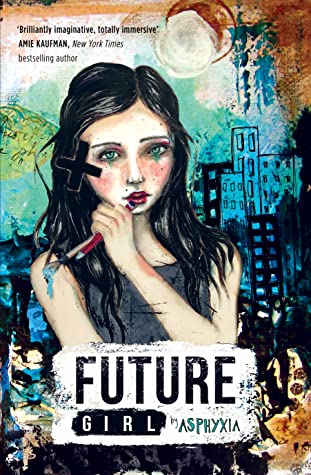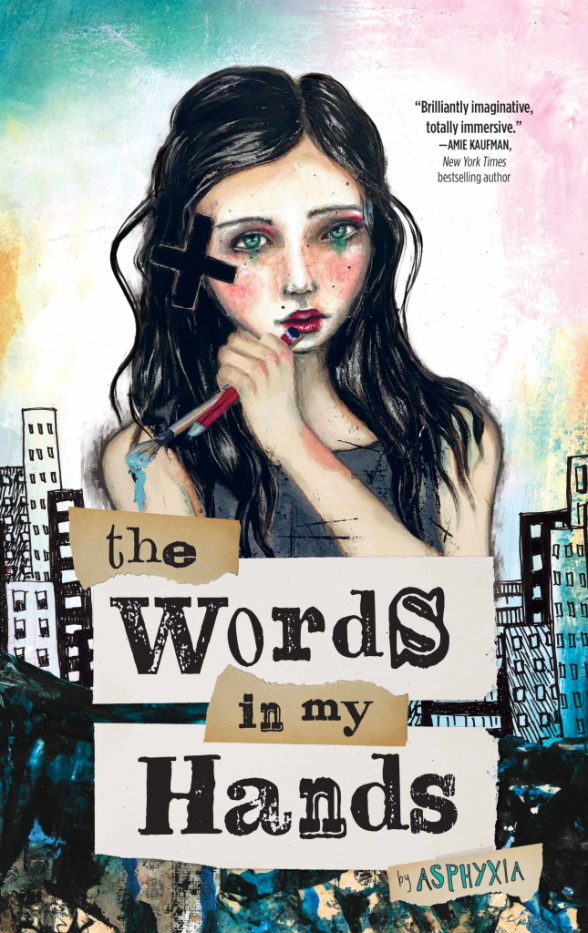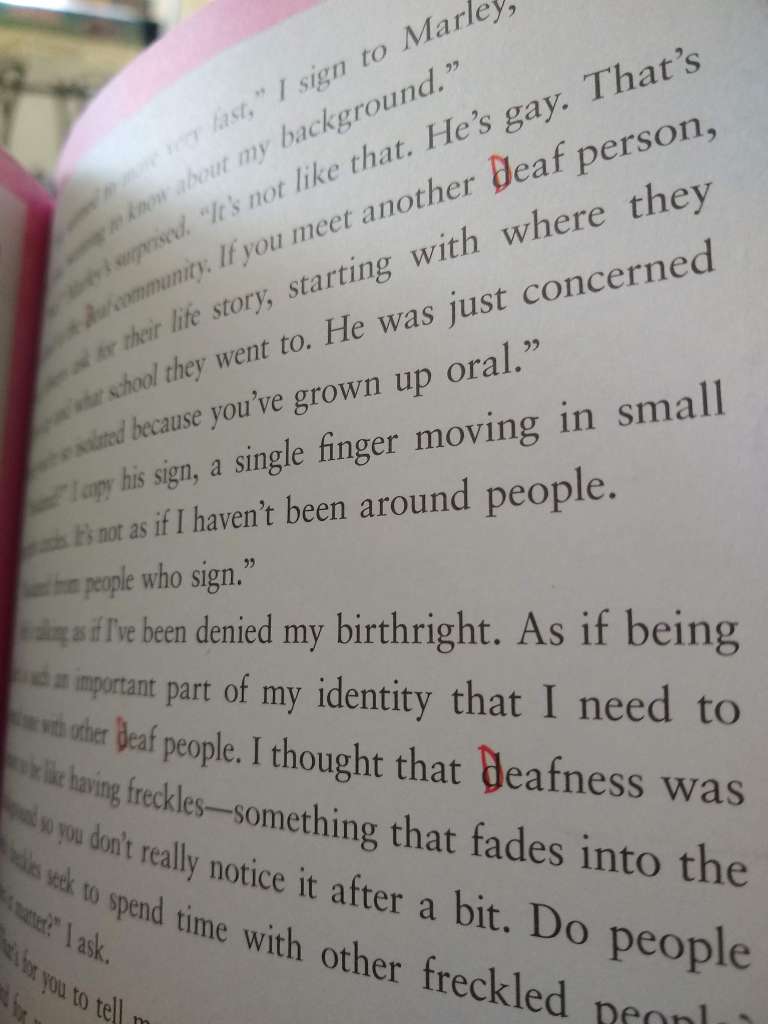Bill @ The Australian Legend first mentioned Future Girl to me, a young adult novel by Deaf artist and writer Asphyxia (she/her). In 2021, the novel was published in North America as The Words in My Hands, so I grabbed it from the library. Firstly, I prefer the Australian title more because it better captures the content. Let me summarize the novel, and here are the covers to compare:


Piper is a deaf girl with hearing aids in a private high school with hearing students. Her best friend, Taylor, often serves as a hearing guide of sorts, which resonated with me. I often ask my spouse what another person said, be it the cashier, the neighbor, or our nieces and nephew. However, while my reliance often occurs when I am not wearing my hearing aids because I didn’t feel like it, Piper is relying on very little hearing and years of speech therapy because to her, deafness is a medical issue.
The novel is set in futuristic Australia, where a huge company has defeated cancer, viruses, even fatness with perfectly portioned meals that have specific chemicals, etc. to do all it’s said to do. Piper’s mom is the lead researcher for this company; Piper grew up eating science-y food, along with everyone else she knows, happily. But lately, claims that the science food is making people sick creep into the public, and Piper’s mom loses her job. The company is in peril, and since the country has been convinced that “wild food” (anything you grow) is poisonous, people are starving. They ration their meals as delivery becomes erratic and piecemeal.
Gas is too expensive, so everyone rides bikes. Typically, Piper uses public transportation, but because her mom lost her job, they’re out of fare money. Piper pulls an old bike out of her shed and heads to a bike shop to get the handle bars fixed.There, she meets Marley, who upon realizing Piper cannot hear tries signing to her. Piper doesn’t know Auslan (Australian Sign Language), but their relationship develops with Marley teaching Piper to sign and then introducing Piper to his mom, a Deaf woman who grows food.
This is where I feel the Australian title fits better. Piper comes from a background of pro-fake food. She is converted into someone learning Auslan and gardening, and soon her desire to feed herself — she’s starving — creates a small movement in her neighborhood that gains attention. She’s looking toward a better, more sustainable future. Instead of a focus on Deafness, Asphyxia’s novel makes Deafness just part of Piper. The real tension is whether Piper’s garden will be discovered by authorities and dismantled, or if she’ll be imprisoned for protesting food shortages and a corrupt government that censors its citizens and is controlled by a puppet government.
That’s not to say the author doesn’t continue moving readers through the world of Deaf culture. As Piper watches Marley’s mom sign, Piper realizes what are called instrument classifiers (how you would manipulate an actual object with your hands, but there’s nothing in your hands) and role shifting (when you become someone else through body language). Asphyxia’s choice to let Piper watch the language more closely instead of focusing only on how fast native signers go, or how pretty it is (it is a beautiful language, but it’s more complicated than that word), was refreshing.
Something different I noticed from other young adult books is that Piper and her mom fight, but it gets better and worse repeatedly. The mom doesn’t seem like an unreasonable villain or an absent parent, and there isn’t that incessant tyrant thing that changes to a happy, huggable conclusion based on newfound pride in one’s child. Piper’s mom is always reluctant, even when Piper is happy, because she’s doing what most moms do: try to help their kid fit in by being “normal.” Why would Piper waste all her speech therapy with signing? Piper can speak clearly (for which she is praised), but she still can’t hear. Piper is smart enough to finish her schooling, but being in school doesn’t feed her, nor does it change the dire conditions of Australia.
Lastly, Asphyxia gives space to hearing characters, and I wonder if that’s because D/deaf people interact with hearing people all the time. Hearing people who describe their happy memories with music, or who recently heard a new bionic ear is on the market, or who assume what the D/deaf person would say and speak for them. It truly feels like Piper is navigating the hearing world and constantly making choices about speaking, signing, hearing aids, interpreters, writing notes, etc. But she does all that so she can grow food and develop into herself.
A fantastic novel, and you’re in for a treat with the formatting, which includes colorful pages and Asphyxia’s artwork presented as Piper’s journal.
CW: audism


I dislike the notion of normal. It’s so boring and vanilla. Why must people who are different, become normal for the comfort of other people? Seems to me like “normal” people should expand their world and learn/accept differences. Life is so much more colorful that way.
What an interesting concept for a book though. I keep going back and forth on whether I want to try to grow some of my own food this year. With prices going up it makes sense. Plus, it would just be kind of fun. I haven’t done it since I was a kid.
LikeLike
I think you would like this book. It has a punk rock aesthetic running in the background, it’s very “take down the man,” it has protests. I can just see you digging it. Plus, it’s not an overly complicated novel because the protagonist is a teen, so if you’re busy/stressed, it’s not hard to get through.
One thing I’ve noticed and come to appreciate is that at Goshen College the word “normal” is downright taboo. The students are required to take courses on culture, many are in nursing and education, I think there’s a disability minor. Just no one seems to use the word “normal” unless they are criticizing it.
LikeLiked by 1 person
Good! More places should do that.
You know me well, I love rebelling. 😉
LikeLiked by 1 person
We’ll you’ve convinced me that this is the sort of YA novel that would appeal to me. I do like dystopias – perhaps because at heart I’m an optimist – and I do like stories about young people coming to grips with their world as long as those stories are not stereotypical and dully written.
LikeLike
I thought there was a lot of mature negotiation that happens between the characters, and while some of it looks familiar, like the boy she likes or the best friend who breaks away from her, it wasn’t done in a way that I recognized due to her deafness and the futuristic setting.
LikeLiked by 1 person
Normal is a complex issue … it can be a useful term for all sorts of analyses but problems occur because it’s loaded with ideas that suggest the opposite is somehow bad rather than just different.
LikeLike
You’re right that “nor normal” is typically considered bad, if not devastating to parents. I hope the opposite of normal is an indication of a possible need for resources and maybe understanding.
LikeLike
Yes, that’s how I’d like to think it is used.
LikeLike
Whew! I’m glad you liked it. I remember the cover, I must have read about it and then given it to Ms18, my granddaughter. I’d ask her for a review but you know – new boyfriend, working long shifts behind the bar. Maybe in a couple of years. If I can get it back I’ll read it for myself.
LikeLike
I think you would like this one for the government aspect. The overreach and attempt to control food consumption, and destroying private gardens just for the sake of quashing any sort of movement. There are even tree thieves.
LikeLike
This sounds really good. I’m also intrigued by this idea of growing food becoming illegal. I feel like there is this resurgence of “back to the land” style living recently so it’s hard to imagine a world where people have been convinced that that is dangerous but I’d be interested to read about it.
LikeLike
Yes, I’m reminded of the co-op boxes you’ve gotten in the past. Stuff like that would be illegal. People even try growing things on public land, and the government labels it “litter” and removes it.
LikeLiked by 1 person
That sounds crazy but then I think of companies like Monsanto and suddenly it all seems a little more plausible.
LikeLike
YES. I had stuck Monsanto in the back of my mind, but now that you’ve moved it to the forefront, that company is horrifying. I’m reminded of the stories of people who use heirloom seeds and do NOT buy from big companies, but then Monsanto seeds will blow into the farmer’s land and grow, and that’s how Monsanto sues them to get paid. So aggressive, such terrifying control over crops.
LikeLiked by 1 person
Yes, that kind of thing is exactly what I was thinking of. If a company can get away with that then the idea of outlawing backyard vegetable gardens is not really as out there.
LikeLiked by 1 person
The gardening component sounds interesting. I can’t imagine how you would police it! And I immediately felt sad about all the generational knowledge that would be lost if it became illegal – I didn’t learn loads from my (very experienced) gardener grandparents, but at least enough to be useful and to make me more confident as I try to figure it out.
As for the word “normal”, it’s tricky – I think about it a lot in terms of lectures, because you do need a way of saying “a child whose home life, school life, general health, and developmental stage are roughly what would be considered average for their age” without having to say that every time. A lot of child health policy here talks about children with universal needs (compared to universal plus additional needs) and I try to use that language whenever possible.
LikeLike
It’s hard for me to picture Australia in general because the landscape changes quite a bit depending on where you are. But, in this futuristic world, people are stealing trees because lumber and fuel are so scarce, so I’m imagining a place where you can see just about everything without tree coverage. Thus, the people who have gardens build elaborate fences that are tall and covered in barbed wire so the government cannot see inside. Essentially, they need enough food to survive and aren’t just growing herbs, etc. which means that indoor gardening wouldn’t be enough. Thus, the government is on the lookout for these pop-up gardens.
“Normal” is challenging, and as I was saying in a comment to Sue, I think it’s helpful to have a sense of “normal” so that anyone who isn’t “normal” has access to resources and support systems. However, we seem to use normal in society (likely different in the medical field?) to mean “needs fixing.” Being seen as broken vs. needing resources and support are quite different in my head, if that makes sense? I mean, for a long time I was ashamed that I needed any prescription medicine for anxiety, etc. but since Nick has gotten medicine for ADHD and I’ve seen how it’s changed his whole world, I can tell I am a gentler, kinder, more patient and supportive person.
LikeLike
This sounds like a pretty cool book, and I must say – COLOURED PAGES???? I’ve quite literally, never seen that. Except in a children’s picture book, which is obviously not a comparison. LIke, a graphic novel yes, or comic, but this???? So very cool.
LikeLike
At first I thought it had to be super pricey, but then I thought about how graphic novels aren’t that much more than a fiction novel, so why not go for it and make an immersive art journal, as if you are actually holding the main character’s diary.
LikeLiked by 1 person
yes true – it’s just a different genre I suppose, but still such a nice treat to open up a book and see!
LikeLiked by 1 person
This looks like a fascinating read and very thought-provoking. I like the way you say Australian Sign Language is discussed and portrayed and the different ways people have of communicating.
LikeLiked by 1 person